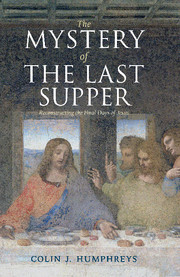Book contents
- Frontmatter
- Contents
- List of illustrations
- Foreword by I. Howard Marshall
- Acknowledgements
- 1 Four mysteries of the last week of Jesus
- 2 Dating the crucifixion – the first clues
- 3 The problem of the last supper
- 4 Can we reconstruct the Jewish calendar at the time of Christ?
- 5 The date of the crucifixion
- 6 The moon will be turned to blood
- 7 Did Jesus use the solar calendar of Qumran for his last supper Passover?
- 8 Does ancient Egypt hold a key to unlocking the problem of the last supper?
- 9 Discovering the lost calendar of ancient Israel
- 10 Was the lost ancient Jewish calendar used in Israel at the time of Jesus?
- 11 The date of the last supper: the hidden clues in the gospels
- 12 From the last supper to the crucifixion: a new analysis of the gospel accounts
- 13 A new reconstruction of the final days of Jesus
- Notes
- Bibliography
- Index of biblical and other ancient sources
- General index
1 - Four mysteries of the last week of Jesus
Published online by Cambridge University Press: 03 May 2011
- Frontmatter
- Contents
- List of illustrations
- Foreword by I. Howard Marshall
- Acknowledgements
- 1 Four mysteries of the last week of Jesus
- 2 Dating the crucifixion – the first clues
- 3 The problem of the last supper
- 4 Can we reconstruct the Jewish calendar at the time of Christ?
- 5 The date of the crucifixion
- 6 The moon will be turned to blood
- 7 Did Jesus use the solar calendar of Qumran for his last supper Passover?
- 8 Does ancient Egypt hold a key to unlocking the problem of the last supper?
- 9 Discovering the lost calendar of ancient Israel
- 10 Was the lost ancient Jewish calendar used in Israel at the time of Jesus?
- 11 The date of the last supper: the hidden clues in the gospels
- 12 From the last supper to the crucifixion: a new analysis of the gospel accounts
- 13 A new reconstruction of the final days of Jesus
- Notes
- Bibliography
- Index of biblical and other ancient sources
- General index
Summary
On a faraway spring morning, in a remote corner of the Roman empire, soldiers crucified a Galilean Jew known as Jesus of Nazareth. No doubt the ruling authorities believed he would be quickly forgotten, a mere blip in history, one of many hundreds they had crucified. Yet, almost two thousand years later, Jesus is widely recognised as one of the most important persons who has ever lived; many would say the most important person.
Arguably the week in which Jesus died is the most momentous week in the history of the world. Probably more has been written about this week (‘Passion Week’ or ‘Holy Week’) than about any other week in history. There are probably more paintings of the crucifixion than of any other historical event (for example, see fig. 1.1). However, there is a problem. Our main sources of information about the last week of Jesus, the four gospels, appear to contradict each other. The purpose of this book is to present new information that reveals that the four gospels in fact give a remarkably coherent account of the last days of Jesus. This enables us to reconstruct these days in detail. The new information presented in this book also throws new light upon our understanding of the words and actions of Jesus.
- Type
- Chapter
- Information
- The Mystery of the Last SupperReconstructing the Final Days of Jesus, pp. 1 - 13Publisher: Cambridge University PressPrint publication year: 2011



